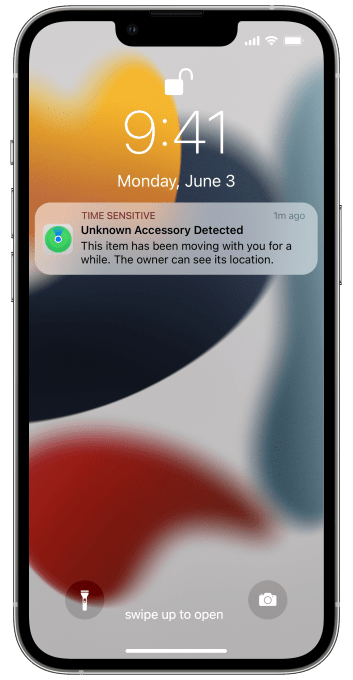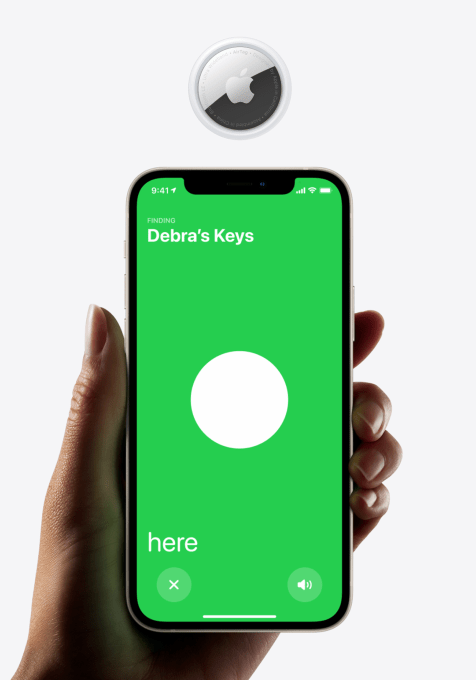Apple today is announcing a series of coming updates for AirTag and the Find My network aimed at addressing the problem of AirTag accessories being used to stalk individuals or people’s property without their knowledge or consent. Following the AirTags’ spring 2021 introduction, numerous media reports and updates from local police departments have warned of incidents where AirTags were being used for unwanted tracking, including of people and valuable property — like cars thieves intended to steal. This resulted in a growing PR nightmare for Apple, which had positioned itself as a consumer privacy-focused company.
Today, Apple is responding to feedback from consumers, safety experts and law enforcement agencies with plans to change how AirTags work.
The company announced it will soon implement a series of updates to both AirTags and the Find My network, initially beginning with new privacy warnings, alerts and documentation. It’s also “investigating” the introduction of other capabilities for a later release, including new precision finding tools and adjustments for AirTag alerts and sounds.
To begin, Apple devices will display new privacy warnings during the AirTag setup process following an upcoming software update. This warning aims to deter people from using AirTags for anything other than tracking their own personal belongings, as intended. It will inform users that tracking people without consent is a crime and that law enforcement can request the identifying information about the owner of the AirTag.

Image Credits: Apple
Apple also said it’s been actively working with law enforcement on all AirTag-related requests it receives, and noted it’s able to provide the account details in response to a subpoena or other valid law enforcement request. This is possible because every AirTag has a unique serial number that’s associated with an Apple ID. The company said by providing this information, law enforcement agencies, in many cases, have been able to trace the AirTag back to its owner, who was then apprehended and charged. Apple declined to share how many cases it’s been involved in, however.
In addition, Apple will change one of its more confusing alerts to assuage people’s fears of being stalked, when that’s not actually the case. The company said it heard from users how they received an alert about an “Unknown Accessory Detected,” which made them think an unknown AirTag was tracking them. But Apple confirmed this alert doesn’t display for unknown nearby AirTags — only AirPods (3rd Gen.), AirPods Pro, AirPods Max or a third-party Find My network accessory. Apple will now update this alert to indicate that “AirPods” have been traveling with the user instead of an “Unknown Accessory.”

Image Credits: Apple
Apple will also update its support documentation about unwanted tracking, which now includes more information about Find My accessories and their tracking alerts. Images will be provided to provide specific examples of the alerts and the documents will point to further instructions on what to do if you’re a victim of stalking.
However, the bigger changes to AirTag and Find My are still in the works.
Among these is a new precision-finding capability that will allow people to locate an unknown AirTag nearby after they receive an alert. Many stalking victims in AirTag cases have complained that when they received the warning that an AirTag was traveling with them, they were unable to find it after searching. This left them feeling exposed and vulnerable, as they weren’t sure if the AirTag was still nearby.

Image Credits: Apple
IPhone 11, iPhone 12 and iPhone 13 users will be able to leverage the precision-finding capability to see both the direction and distance of the unknown AirTag when it’s in range — just as they could with their own AirTag devices. The feature uses input from the camera, ARKit, accelerometer and gyroscope to direct them to the AirTag, along with sound, haptics and visual feedback.
Another complaint that emerged from AirTag stalking cases is how much of a delay there has been between the unknown AirTag being placed with an individual to stalk them and when the victim’s device actually warned them. Some people said the AirTag had been traveling with them for hours, all over town, before they were alerted by the software.
Apple said it plans to update its alert logic to “notify users earlier” that an unknown AirTag or Find My network accessory (which would include AirTag alternatives like Chipolo) may be traveling with them. However, the company didn’t say how soon users would receive these warnings.
Apple will also later adjust how its alerts work. It will simultaneously display a visual alert on your iPhone, iPad or iPod touch when an unknown AirTag is detected with you and play a sound. This alert will direct users to further assistance with locating the AirTag using the precision finding tools or allow them to trigger the AirTag to make a sound — something that can be helpful if the AirTag was placed somewhere the alert is hard to hear. The finding tools, meanwhile, can help if the AirTag speaker had been tampered with, which is something that’s been an issue with some stalking cases. In fact, AirTags with speakers disabled were even being found sold on eBay and Etsy in recent weeks.
Apple said it will also later adjust the tone sequence to use louder tones to make unknown AirTags more easily findable.
In announcing the news, Apple made the argument that using technology to stalk people is a societal problem and AirTags have been used for good, too. It pushed other device makers to follow its lead in adding more proactive features like this to their own products, as well. AirTag rival Tile, for example, said it was working on safety features but hasn’t yet rolled them out. The company was recently acquired by the family tracking and communication app Life360.
Safety groups, including the National Network to End Domestic Violence and the National Center for Victims of Crime, praised Apple’s efforts. The former, via Director Erica Olsen, said it’s happy “Apple is engaging in the conversation about victim safety” and is “continuing to improve safeguards.” The latter issued a bit more tepid statement via Executive Director Renee Williams.
“What these unwanted tracking alerts are showing us is that Apple’s system is working and, at the same time, raising awareness of this issue,” said Williams. “If anyone is experiencing technology-enabled abuse, stalking, or harassment, we can be a resource for them in addition to law enforcement,” she added.
While Apple may be correct that it’s doing far more than others in the space to address issues with unwanted tracking, it’s also held to a higher standard. Not only does Apple have the money and resources to invest in more thorough product development, it positioned the company as one that cares about consumer privacy, including with recent launches like its anti-tracking feature for apps.
It’s unclear why Apple didn’t have the foresight to consider how AirTags could be misused. And it raises the question as to whether the tech industry’s larger struggle to hire more women could have been an issue here. Women, who represent the majority of stalking victims, could have easily identified issues with how AirTags function.
Reached for comment, Apple declined to say when the updates would roll out, or what software version number would include the changes — which would be helpful information for consumers who want to know if and when they’re protected by the new features.
from TechCrunch https://ift.tt/DNPbqJl


No comments:
Post a Comment
welcome